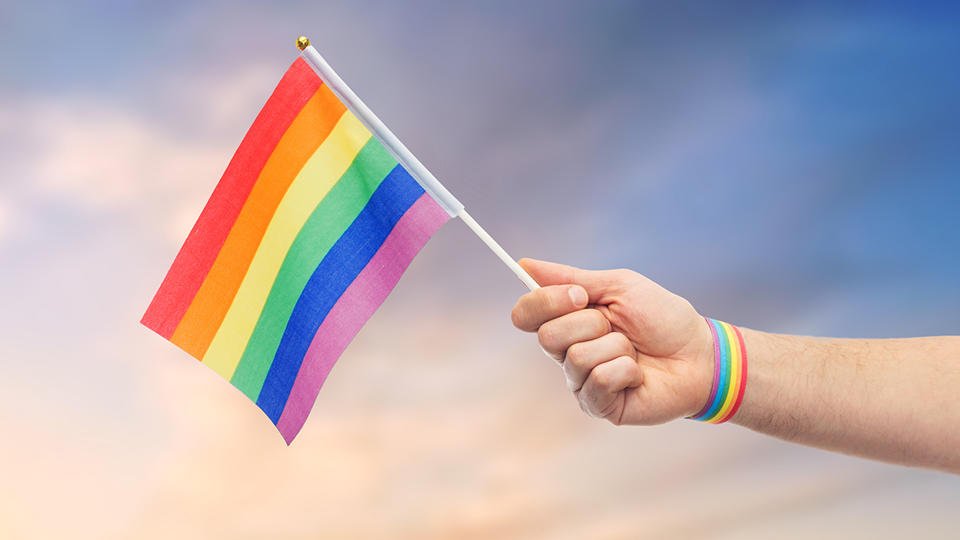

As part of its attempts to discredit NATO, Russia tells absurd stories about ‘all-gay battalions’ to exploit the homophobic attitudes within society.
In the context of the full-scale invasion of Ukraine, Russia is trying to win not only on the literal battlefield, carrying on to destroy Ukrainian cities and villages but also on the media battlefield. In order to achieve its political goals and sway the public, Russian propagandists are not averse to using diverse influence techniques and disinformation tactics. More specifically, the Russian propaganda machine uses false information about LGBTIQ+ people to discredit its ‘enemies’ - the EU, NATO and the Ukrainian army. How does it work and does Russia succeed? MediaSapiens explains whether homophobia exists in the Ukrainian army; what disinformation about LGBTIQ+ people is; how and why Russian propaganda uses it; and how it affects attitudes towards the Ukrainian army.
What? LGBTIQ+ disinformation?
According to a study by Detector Media, Russian propaganda systematically employs so-called LGBTIQ+ disinformation. In other words, it is based on homophobic prejudice — a hostile attitude towards LGBTIQ+ people (people who have identified themselves as lesbian, gay, bisexual, transgender, intersex, or questioning). For example, Russian propaganda calls all Ukrainian military ‘gays’ or ‘fa***ts’ with the intention of humiliating and discrediting them. Alternatively, it attempts to discredit the NATO military similarly, claiming that it is an ‘LGBTIQ+ Alliance’ that is not able to resist the serious and strong Russian army.
Generally speaking, disinformation about LGBTIQ+ people is demonstrably false or misleading information that exploits people’s sexual orientation and is created and disseminated for economic gain or to deliberately mislead people. According to the report of the European Parliament ‘Disinformation Campaigns About LGBTI+ People in the EU and Foreign Influence’, disinformation related to LGBTIQ+ issues is disseminated with the intention to take advantage of the social polarisation pertaining to the rights of LGBTIQ+ people, which in turn can incite hatred toward LGBTIQ+ people and provoke hate crimes. In particular, LGBTIQ+ disinformation often contains an element of hate speech.
This type of disinformation works owing to widespread homophobia, particularly in Russian society. In Russia, homophobia, or the so-called ‘fight against LGBTIQ+ propaganda’, is part of national policy. According to the Yuri Levada Analytical Center, as of October 2021, 28% of Russian women believed that they have the right to same-sex relationships, 66% were convinced that they do not; among men, these figures are 28 and 73 per cent. Despite this, on October 27, 2022, the Russian State Duma deputies passed a law banning the ‘propaganda of non-traditional sexual relations’ in Russia. All 400 deputies present at the meeting supported it. According to co-author of the bill Nina Ostanina, Russian deputies, adopting such laws, respond to the ideological war waged against Russia. Prohibiting ‘LGBT propaganda’ is not a new step for Russia. Laws on this have been in place since 2013, but the recent amendments prohibit ‘propaganda of non-traditional sexual relations’ now among adult Russian citizens, not just children. The Russian president and other high-ranking officials occasionally make homophobic statements.
And why does Russia need this disinformation?
The European Parliament report explains that Russia uses disinformation about LGBTIQ+ people to weaken the credibility and relevance of the EU and NATO. Pro-Russian social media users are trying to discredit European states and international organizations in various ways, taking advantage of the high level of homophobia in Russian society. However, in this way, Russia is also trying to discredit the Ukrainian army, sometimes suggesting in the media that separate gay divisions are being created in Ukraine.
That is, for the Russian propaganda machine, the homophobia that exists in society comes in handy: such disinformation humiliates representatives of the LGBTIQ+ community; devalues their role in society; views such people based solely on their sexual orientation; claims that these people are supposedly weak or inferior. For a typical propagandist, an LGBTQI+ person is an incompetent person who does not possess any skills: neither how to lead nor how to fight. As a result, propagandists often refer to a person as gay in order to discredit him, whether they are an official or a military man.
According to propaganda, having gays and lesbians in the Ukrainian army will weaken it and make it incapable of resisting the Russians. In practice, this has not proven to be true. Generally speaking, disinformation about LGBTIQ+ people would not work if the level of homophobia in Russian and Ukrainian societies was lower and if people were more tolerant of otherness.
Does homophobia exist in the Ukrainian army?
LGBTIQ+ people do serve in the Ukrainian army. During recruitment to the Ukrainian army, people are not asked about their sexual orientation, because it does not affect their ability to serve. It would be discriminatory to focus on this aspect.
A representative of the LGBTIQ+ community, Ukrainian military Elias Foster has been serving since 2019. He says that he feels comfortable in the army. ‘All Soviet stereotypes about the army have nothing to do with modern reality. Today there is no ‘dedovshchina’ in the army, nothing like that. However, I had to face homophobia. It happened after my brothers-in-arms saw my posts,’ says Elias. He explained that, fortunately, everything was mere talk, and he did not face any harassment because of his sexual orientation or anything like that. ‘Although I was outed because I had not come out. But I was ready for it,’ explains Elias, ‘My brothers-in-arms perceived the information about my orientation in different ways, some accepted it and remained friendly, others started joking and tried to humiliate me. The leadership was surprised, but there were no negative reactions from them.’
Elias Foster says that everyone is equal at the frontline, but many people think that representatives of the LGBTIQ+ community are afraid to fight, hiding from the draft. ‘It is not so. There are many LGBTIQ+ people in the Ukrainian army, and many of them are at the contact line,’ he says. ‘It happens that after returning from the frontline, some people cannot believe that you are a lesbian or gay and that you are fighting. This is devaluation. But there are those who support and help. And some, no matter what, try to humiliate you somehow. Although it is clear that the sexual orientation of the defenders is not important.’
Psychologist, and senior combat medic Alina Sarnatska says she joined the army on 5 March 2022. ‘In the last days of February, I tried to join the Armed Forces, but it was not easy, so I was looking for friends who serve in separate units to get to them, not through the military registration and enlistment office,’ says Alina. ‘There were many homophonic jokes, some not very nice expressions, but not homophobia as such. I know openly gay people and bisexuals, and there were no negative comments about them. Because we are an army of a warring country. There is a feeling of warm attitude towards brothers, sisters, and everyone supports each other.’
Alina Sarnatska adds that she has not seen homophobia and negative attitudes towards openly LGBTIQ+ people in the army, because now people are very united and the army of the country at war has other tasks and problems. ‘That is, people react normally, they react to the person themself, not to their social identity. The most important thing is how a person performs their duties, whether they can be counted on,’ she says. ‘But I know cases when there was a negative attitude of the leadership because of this. I have one friend who has such a situation. He wants to move to another unit. That is, he already had conflicts with the leadership, and then they found out about his sexual orientation, and stuck to it.’
Alina says that she wrote a post for Coming Out Day about LGBTIQ+ military personnel. ‘I received hundreds of supportive comments. There were also some devaluing comments. But many people understand that our war is a struggle for values, freedom, and equality. Many people already understand that homophobia is part of the Russian ‘[spiritual] staples’ that are not embedded in our society and must go away along with other elements of the Russian world,’ explains Alina ‘Before joining the army, I thought that the army was a very homophobic structure, but I find it quite the opposite. I serve with educated, intelligent, wonderful people’.
She adds that the biggest problem for LGBTIQ+ soldiers is not homophobia within the army, but national laws. Because, for example, LGBTIQ+ people cannot get married and their families, and children do not receive the social guarantees that everyone else receives. ‘That is, people are willing to sacrifice themselves in defence of Ukraine, the civilian population, and, unfortunately, they die, but do not receive the same attitude, the same respect as other heroes,’ says Alina. ‘For example, I know two girls, they have children, they have been together for a long time, and the children are growing up. But if a servicewoman dies, then the children, not born to her but to her partner, will not receive the same benefits and social security as the children of a servicewoman. This is absolutely wrong and unfair. In other cases, a child may be removed from the family altogether: if its biological mother died, and legally the child is not related to the other partner.’
And what about the military leadership? Does it react to homophobia if it occurs?
According to the lawyer of the Network of Para-legals project Anastasiya Bondarenko, cases of homophobia in the army are gradually decreasing, and all of them are not systemic. ‘We are aware of cases that mainly concerned people who were in conscription service. As for people who serve under contract or have been mobilized, since the beginning of the full-scale invasion, such cases are rare,’ says the lawyer. ‘However, there was not a significant number of openly LGBTIQ+ people in the Ukrainian army, which may have also affected the situation. But with the beginning of the full-scale invasion, the number of LGBTIQ+ military personnel increased, and cases of homophobia remained isolated.’
Anastasia Bondarenko explains that usually, homophobia was called harassment or threat of physical violence. ‘The reaction of the military leadership to such cases is usually quite quick and positive. The leadership does everything to protect a person who has faced homophobia and restore a normal atmosphere within the unit,’ adds the lawyer. ‘Also, information about all the cases we know about very quickly got into the media, so the cases became public. The leadership is usually open to cooperation with human rights organizations and provides information about the conflict and its resolution.’
According to the lawyer, the narrative about homophobia in the Ukrainian army was ‘imported’ from the aggressor country and was fueled by pro-Russian organizations and the Russian church. ‘Now some of these organizations have disappeared, some have switched their attention to other problems,’ adds Anastasiya Bondarenko. Earlier, Detector Media has already told the story of the Ukrainian LGBT Military for Equal Rights community and why Russian disinformation is the main enemy of the LGBTIQ+ human rights NGO.
So Ukrainians are not homophobic and do not harass LGBTIQ+ soldiers?
Despite the fact that LGBTIQ+ soldiers are also defending Ukraine on the battlefield, they are sometimes harassed. For example, there was a case of beating of soldier Viktor Pylypenko on the grounds of hatred for his sexual orientation. However, such cases are isolated and in the context of the full-scale invasion, the attitude towards the LGBTIQ+ military in Ukraine is gradually changing. This is evidenced by the fact that the petition for the legalization of same-sex marriage in Ukraine in a short time gained the necessary 25 thousand votes for consideration. ‘At this time, every day can be the last. Let people of the same sex have the opportunity to create a family and have an official document confirming this. They need the same rights as traditional couples,’ the petition reads.
According to a sociological survey conducted by the National Democratic Institute on August 2-9, 2022, only 31% of respondents in Ukraine believed that homosexual people should have the same rights as heterosexual people. A categorical opposition to equal rights was reported by 19% of respondents. The above data are a good indicator that Ukrainian society is changing and becoming more tolerant. The trend is confirmed by a survey conducted by the Kyiv International Institute of Sociology in 2022. Activists of the LGBTIQ+ human rights centre Nash Svit compared the survey results to those of a similar poll conducted in 2016. It turned out that over six years in Ukraine, the number of people who have a negative attitude towards LGBTIQ+ people has decreased by half: in 2016, 60.4% had a negative attitude, compared to 38.2% in 2022.
Read more about how Russia uses disinformation about LGBTIQ+ people to achieve geopolitical goals in the full study by Detector Media.



